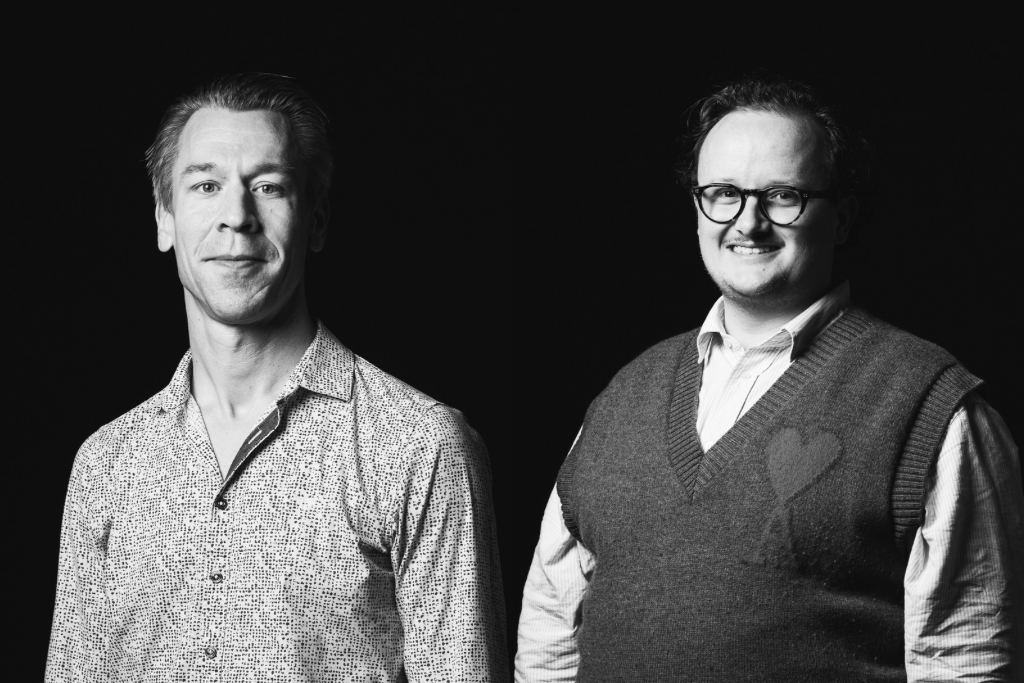Confrontation and entertainment in Die Dreigroschenoper
Dramaturgy. What does it involve, what do dramaturgs actually do, and what role do they play in The Threepenny Opera?
Toneelgroep Maastricht dramaturg Ludo Costongs and Opera Zuid dramaturg Joep Hupperetz are collaborating on this iconic work by Bertolt Brecht and Kurt Weill. The result is a fascinating conversation about their craft, epic theatre, and sharp social criticism wrapped in toe-tapping jazzy music.
What exactly does dramaturgy involve, and what are your roles in The Threepenny Opera?
Joep: ‘A dramaturg researches the background of the piece being performed. After that, we’re essentially the first audience member.’
Ludo: ‘Exactly. A dramaturg checks whether the action fits the text, whether it’s clear what we’re seeing and whether it matches what the director wants to convey. We make sure the actor’s line of thought makes sense and is understandable for the audience. I’ve also been involved in translating and shortening The Threepenny Opera.’
Joep: ‘In the original Dreigroschenoper, the roles were written for actors and just one classical singer. We’ve turned that around: our Threepenny Opera is performed by one actor who can also sing, alongside opera singers. That allows us to perform all the musical numbers – including those that were originally cut because the actors couldn’t manage them vocally. As a result, our version actually contains more (original!) music than the ‘standard’ Threepenny Opera.’
What did Brecht and Weill want to convey with The Threepenny Opera?
Ludo: ‘Brecht’s work is an adaptation of The Beggar’s Opera by John Gay from 1728. In his new version, he put the lives of beggars at the centre. In 1928, Brecht wanted to draw attention to an important social issue: how society treated the victims of industrialisation and the First World War. Brecht and Weill wanted audiences to look critically at the darker sides of capitalism. The message, however, wasn’t always received as they’d hoped.’
Joep: ‘Indeed. The Threepenny Opera was a success, but not necessarily because of its social criticism. The songs, for instance, became popular as pop and jazz hits… whereas Brecht and Weill had actually thought that the combination of harsh, critical lyrics – the Ballad of Mack the Knife is an indictment of unsolved murders and crimes! – with cheerful, danceable tunes would create a sense of alienation for the audience.’
What’s the purpose of that alienation?
Joep: ‘The audience should feel a certain distance from what happens on stage they shouldn’t be swept away emotionally, as in Romantic opera. Brecht called this epic theatre. He thought opera was an excellent medium for that, because the moment someone starts singing, it’s automatically far removed from reality. After all, no one argues in song in real life.’
Ludo: ‘The Verfremdungseffekt – or alienation effect – is a technique to make the audience aware that they’re watching theatre, with the aim of encouraging them to reflect on their own situation or the world around them. You can create that effect, for instance, through a sudden change of lighting, or by having singers address the audience directly. Through such a stylistic break – that moment of alienation – a character or an action is suddenly seen in a new light. Brecht and Weill force the people in the auditorium to think about what they’re seeing.’
Joep: ‘In our production, the surtitles strengthen that effect. Especially in the sung numbers, where the music sounds light and rhythmic, reading the text in your own language adds another layer, a sense of immediacy. The message hits harder that way.’
Why stage The Threepenny Opera now?
Ludo: ‘In recent years, we’ve given free rein to hyper-capitalist thinking. As a result, social discontent has grown. The Threepenny Opera shows, in a simple yet sharp way, what happens when you push that thinking to the extreme, that it’s hardly surprising when unrest follows. The piece doesn’t offer a solution, but it certainly provokes thought. Brecht believed society is man-made: we’ve shaped it into what it is today, so we can also steer it in another direction. See it, recognise it… do something about it!’
Joep: ‘And what better sounds to do that to than Weill’s jazzy, cabaret-like music? That contrast – that tension between confrontation and entertainment – that’s the essence of The Threepenny Opera: it rubs up against itself on every level.’
Interview: Kyra Bertram
